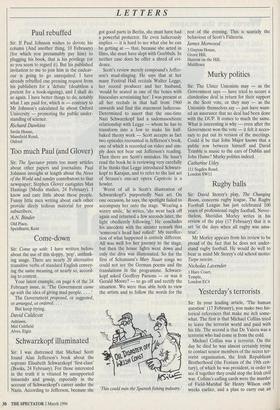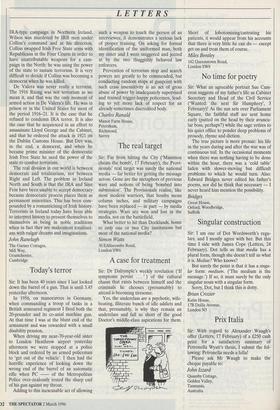Yesterday's terrorists
Sir: In your leading article, 'The human question' (17 February), you make two his- torical references that make me itch some- what. The first is that Michael Collins tried to leave the terrorist world and paid with his life. The second is that De Valera was a terrorist who had come in from the cold.
Michael Collins was a terrorist. On the day he died he was almost certainly trying to contact senior members of the secret ter- rorist organisation, the Irish Republican Brotherhood (the Fenians of the 19th cen- tury), of which he was president, in order to see if together they could stop the Irish civil war. Collins's calling cards were the murder of Field-Marshal Sir Henry Wilson only weeks earlier, and a plan to carry out an IRA-type campaign in Northern Ireland. Wilson was murdered by IRB men under Collins's command and at his direction. Collins swapped Irish Free State arms with Republicans in the Four Courts in order to have unattributable weapons for a cam- paign in the North: he was using the power of the state to sustain terrorism. It is very difficult to decide if Collins was becoming a democrat when he was killed.
De Valera was never really a terrorist. The 1916 Rising was not terrorism as we mean it, and that was the only moment of armed action in De Valera's life. He was in prison or in the United States for most of the period 1916-21. It is the case that he refused to condemn IRA terror. It is also the case that he acquiesced in an effort to assassinate Lloyd George and the Cabinet, and that he ordered the attack in 1921 on the Dublin Customs House. But Dev was, in the end, a democrat, and when he became prime minister of the democratic Irish Free State he used the power of the state to combat terrorism.
The real division in our world is between democrats and totalitarians, not between Right and Left. The problem in Ireland North and South is that the IRA and Sinn Fein have been unable to accept democracy because democratic process places them as permanent minorities. This has been com- pounded by a romanticising of Irish history. Terrorists in Ireland today have been able to interpret history to present themselves to themselves as being in noble traditions when in fact they are malcontent totalitari- ans with vulgar dreams and imaginations.
John Ranelagh
The Garner Cottages, Mill Way, Grantchester, Cambridge



































































 Previous page
Previous page